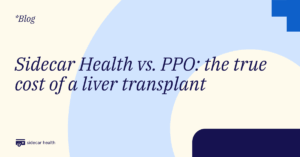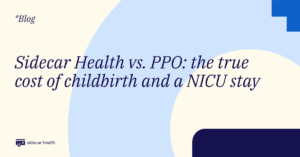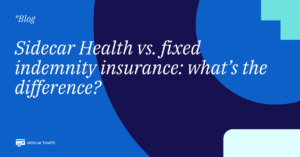
By Chris Patton, VP of Channel Sales
Employer-sponsored health insurance coverage is expensive. Fully insured group premiums have steadily increased for decades, impacting small, medium, and large businesses alike. In 2023, the average annual premium for these plans was $23,968—an increase of more than $1,000 from 2022. As inflation climbed in 2023, both single and family premiums increased by seven percent. Purchasers have been hit with ever-increasing premiums that appear to secure less and less coverage. Product strategies that allow the consumer to participate in directing where healthcare dollars are spent have been attempted but fall short due to the lack of pricing transparency from providers.
Innovative coverage models like Sidecar Health run on an instant-pay non-network model, allowing members to get care when and where they need it without worrying about whether the provider participates in a particular network or not. With this model, patients can see average provider pricing in their area along with benefit amounts for every healthcare service. Then, they can compare options and make the best healthcare decisions for themselves and their families. And, not to our surprise, once employers see how much they can save on premiums, they become completely aligned with the mission.
Addressing Flawed Cost Drivers
Up until this point, insurers have tried everything to influence member behavior and impact the premium cost curve. For decades, the industry worked on wellness and incentive programs to drive people to be healthier, rationalizing that if people were taking care of themselves, it would decrease utilization and, therefore, reign in out-of-control premium increases.
Unfortunately, the U.S. has the highest rate of people with multiple chronic conditions and an obesity rate nearly twice the OECD average. Americans also see physicians less often than people in most other countries and have among the lowest rates of practicing physicians and hospital beds per 1,000 population. It was clear these incentives were not working, whether that be due to consumer behavior or socioeconomic and geographic barriers to accessing care.
Helping Consumers Take Control of Their Healthcare Finances
So, how do Sidecar Health customers access quality care at an affordable price? Sidecar Health provides benefit transparency to the member and the ability to pay providers at the time of service. As it turns out, getting paid promptly is an incentive for providers, and they can avoid the typical lengthy delays with health insurance claims processing. Instant pay non-network insurance puts people’s wallets front and center. For the first time, consumerism is having an impact on access and quality. Our customers are engaged and purchasing health care services in the same way they purchase anything else in their lives.
We’ve found that consumers are paying attention and responding by shifting how they access care. With Sidecar Health’s major medical plans, mental health utilization is 1.5 to 2 times the level of utilization typically seen with traditional health insurance plans. We’ve also seen a 20 percent reduction in emergency room utilization when compared to traditional health insurance plans. As a result of increased engagement, our customers know they have greater options to access care that are often more timely, effective, and less costly than an ER.
Shifting Industry Trends
Other large health insurers have been forced to respond across the market. Sidecar Health has seen competitors significantly reduce their renewal proposal to keep business, which demonstrates the importance of having “industry disruptors” who shake things up and explore better solutions for increased flexibility, access, and decreased costs.
It’s always hard to change health insurance from the inside, not unlike other industries that have a fixed way of doing things. Sidecar Health understands that if we want to see changes in the marketplace, we have to act on our frustrations for employees and employers. These new models provide a clear path toward closing the longstanding gaps in care and treatment and helping consumers regain control of their healthcare decisions.
About Chris Patton
With leadership experience spanning more than 25 years, Chris has significant experience in both the retail and wholesale distribution of small group health insurance products. Chris has held leadership roles on the carrier side at Kaiser Permanente and Centene in addition to roles at a National General Agency and both the private and public commercial exchanges in California.
Over his career, Chris has developed and implemented a diverse range of product distribution models which served as the foundation of several high-performance sales organizations. Chris’ multidisciplinary approach to developing an organization is complimented by his unique style of “metric motivation” which sets the standards by which an organization can measure success throughout the sales cycle.
Chris is an active public speaker in the insurance industry and is regularly called upon by members of the California Legislature as an expert on health insurance and healthcare reform. He is a founding member of and currently serving on the CAHU Education Foundation Board.
ABOUT SIDECAR HEALTH
Sidecar Health is on a mission to make quality healthcare affordable and accessible to everyone in the US. We believe in a world where you have the freedom to choose any provider, and pricing is understandable and clear. So, we’ve rewired health insurance with a modern, intuitive and tech-forward approach that removes obstacles to excellent care and empowers you with the information you need to make smart decisions about your care. Sidecar Health group insurance plans deliver industry leading major medical coverage for mid-size and large employers in Ohio and Georgia. We insure members in 32 states and growing. For more information visit sidecarhealth.com.


